- Home
- Alice Munro
Lives of Girls and Women Page 8
Lives of Girls and Women Read online
Page 8
From such a vantage point, my mother did seem a wildwoman.
She drove our thirty-seven Chev over all the highways and back roads of Wawanash County, drove it over gravel roads, dirt roads, cow tracks, if she thought they might lead her to customers. She carried a jack and a shovel in the trunk, and a couple of short planks for easing her way out of mud-holes. She drove all the time as if she would not be surprised to see the ground crack open ten feet in front of her wheels; she honked her horn despairingly at blind country corners; she was continually worried that the wooden bridges would not hold, and she would never let anything force her on to the treacherous crumbling shoulders of the road.
The war was still on then. Farmers were making money at last, making it out of pigs or sugar beets or corn. Possibly they did not mean to spend it on encyclopedias. They had their minds set on refrigerators, cars. But these things were not to be had, and in the meantime there was my mother, gamely lugging her case of books, gaining entry to their kitchens, their cold funeral-smelling front rooms, cautiously but optimistically opening fire on behalf of Knowledge. A chilly commodity that most people, grown up, can agree to do without. But nobody will deny that it is a fine thing for children. My mother was banking on that.
And if happiness in this world is believing in what you sell, why, then my mother was happy. Knowledge was not chilly to her, no; it was warm and lovely. Pure comfort even at this stage of her life to know the location of the Celebes Sea and the Pitti Palace, to get the wives of Henry VIII in order and be informed about the social system of ants, the methods of sacrificial butchery used by the Aztecs, the plumbing in Knossos. She could get carried away, telling about such things; she would tell anybody. “Your mother knows such a lot of things, my,” said Aunt Elspeth and Auntie Grace lightly, unenviously, and I saw that to some people, maybe to most people, knowledge was just oddity; it stuck out like warts.
But I shared my mother’s appetite myself, I could not help it. I loved the volumes of the encyclopedia, their weight (of mystery, of beautiful information) as they fell open in my lap; I loved their sedate dark green binding, the spidery, reticent-looking golden letters on their spines. They might open to show me a steel engraving of a battle, taking place on the moors, say, with a castle in the background, or in the harbour of Constantinople. All bloodshed, drowning, hacking off of heads, agony of horses, was depicted with a kind of operatic flourish, a superb unreality. And I had the impression that in historical times the weather was always theatrical, ominous; landscape frowned, sea glimmered in various dull or metallic shades of grey. Here was Charlotte Corday on her way to the guillotine, Mary Queen of Scots on her way to the scaffold, Archbishop Laud extending his blessing to Stafford through the bars of his prison window— nobody could doubt this was just the way they looked, robes black, lifted hands and faces white, composed, heroic. The encyclopedia did of course provide other sorts of things to look at: beetles, varieties of coal, diagrammed insides of engines, photographs of Amsterdam or Bucharest taken on smudgy dim days in the nineteen-twenties (you could tell by the little high square cars). I preferred History.
Accidentally at first and then quite deliberately I learned things from the encyclopedia. I had a freak memory. Learning a list of facts was an irresistible test to me, like trying to hop a block on one foot.
My mother got the idea that I might be useful in her work.
“My own daughter has been reading these books and I am just amazed at what she has picked up. Children’s minds are just like flypaper, you know, whatever you give them will stick. Del, name the presidents of the United States from George Washington down to the present day, can you do that?” Or: name the countries and capitals of South America. The major explorers, tell where they came from and where they went. Dates too please. I would sit in a strange house rattling things off. I put on a shrewd, serious, competitive look, but that was mostly for effect. Underneath I felt a bounding complacency. I knew I knew it. And who could fail to love me, for knowing where Quito was?
Quite a few could, as a matter of fact. But where did I get the first hint in that direction? It might have been from looking up and seeing Owen, without two dates or capitals or dead presidents to string together, as far as anybody knew, tenderly, privately wrapping a long chewed-out piece of gum around his finger. It might have been from the averted faces of country children, with their subtle, complicated embarrassment. One day I did not want to do it any more. The decision was physical; humiliation prickled my nerve-ends and the lining of my stomach. I started to say, “I don’t know them—” but was too miserable, too ashamed, to tell this lie.
“George Washington, John Adams, Thomas Jefferson—”
My mother said sharply, “Are you going to be sick?”
She was afraid I might be about to throw up. Both Owen and I were totally committed, on-the-spot throwers-up. I nodded and slid off the chair and went and hid in the car, holding my stomach. My mother when she came had figured out that it was more than that.
“You’re getting self-conscious,” she said in a practical tone. “I thought you enjoyed it.” The prickling started again. That was just it, I had enjoyed it, and it was not decent of her to say so. “Shyness and self-consciousness,” said my mother rather grandly, “those are the luxuries I could never afford.” She started the car. “Though I can tell you, there are members of your father’s family who would not open their mouths in public to say their house was burning down.”
Thereafter when asked—lightly asked—“Do you want to do some questions today?” I would slump away down in the seat and shake my head and clutch my stomach, indicating the possible quick return of my malady. My mother had to resign herself, and now when I rode out with her on Saturdays I rode like Owen, free and useless cargo, no longer a sharer in her enterprises. “You want to hide your brains under a bushel out of pure perversity but that’s not my lookout,” she said. “You just do as you please.”
I still had vague hopes of adventure, which Owen shared, at least on the more material level. We both hoped to buy bags of a certain golden-brown candy, broken in chunks like cement and melting almost immediately on the tongue, sold in one special harnessdraped horsy-smelling country store. We hope at least to stop for gas at a place that sold cold pop. I hoped to travel as far as Porterfield or Blue River, towns which derived their magic simply from being places we did not know and were not known in, by not being Jubilee. Walking in the streets of one of these towns I felt my anonymity like a decoration, like a peacock’s train. But by some time in the afternoon these hopes would ebb, or some of them would have been satisfied, which always leaves a gap. In my mother too there would be some ebbing, of those bright ruthless forces which pushed her out here in the first place. Approaching dark, and cold air coming up through a hole in the floor of the car, the tired noise of the engine, the indifference of the countryside, would reconcile us to each other and make us long for home. We drove through country we did not know we loved—not rolling or flat, but broken, no recognizable rhythm to it; low hills, hollows full of brush, swamp and bush and fields. Tall elm trees, separate, each plainly showing its shape, doomed but we did not know that either. They were shaped like slightly opened fans, sometimes like harps.
Jubilee was visible from a rise about three miles away, on the No. 4 Highway. Between us and it lay the river-flats, flooded every spring, and the hidden curve of the Wawanash river, and the bridge over it, painted silver, hanging in the dusk like a cage. The No. 4 Highway was also the main street of Jubilee. We could see the towers of the Post Office and the Town Hall facing each other, the Town Hall with its exotic cupola hiding the legendary bell (rung for wars starting and ending, ready to ring in case of earthquake, or final flood) and the Post Office with its clock-tower, square, useful, matter-of-fact. The town lay spread almost equidistantly on either side of the main street. Its shape, which at the time of our return would usually be defined in lights, was seen to be more or less that of a bat, one wing lifted slightly, b
earing the water tower, unlighted, indistinct, on its tip.
My mother would never let this sighting go by without saying something. “There’s Jubilee,” she might say simply, or, “Well, yonder lies the metropolis,” or she might even quote, fuzzily, a poem about going in the same door as out she went. And by these words, whether weary, ironic, or truly grateful, Jubilee seemed to me to take its being. As if without her connivance, her acceptance, these streetlights and sidewalks, the fort in the wilderness, the open and secret pattern of the town—a shelter and a mystery—would not be there.
Over all our expeditions, and homecomings, and the world at large, she exerted this mysterious, appalling authority, and nothing could be done about it, not yet.
My mother rented a house in town, and we lived there from September to June, going out to the house at the end of the Flats Road only for the summers. My father came in for supper, and stayed overnight, until the snow came; then he came in, if he could, for Saturday night and part of Sunday.
The house we rented was down at the end of River Street not far from the CNR station. It was the sort of house that looks bigger than it is; it had a high but sloping roof—the second storey wood, the first storey brick—and a bulging bay window in the dining room and verandahs front and back; the front verandah had a useless and in fact inaccessible little balcony stuck into its roof. All the wooden parts of the house were painted grey, probably because grey does not need to be repainted so often as white. In the warm weather the downstairs windows had awnings, striped and very faded; then the house with its bleached grey paint and sloping verandahs made me think of a beach—the sun, the tough windy grass.
Yet it was a house that belonged to a town; things about it suggested leisure and formality, of a sort that were not possible out on the Flats Road. I would sometimes think of our old house, its flat pale face, the cement slab outside the kitchen door, with a forlorn, faintly guilty, tender pain, as you might think of a simple old grandparent whose entertainments you have outgrown. I missed the nearness of the river and the swamp, also the real anarchy of winter, blizzards that shut us up tight in our house as if it were the Ark. But I loved the order, the wholeness, the intricate arrangement of town life, that only an outsider could see. Going home from school, winter afternoons, I had a sense of the whole town around me, all the streets which were named River Street, Mason Street, John Street, Victoria Street, Huron Street, and strangely, Khartoum Street; the evening dresses gauzy and pale as crocuses in Krall’s Ladies’ Wear window; the Baptist Mission Band in the basement of their church, singing There’s a New Name Written Down in Glory, And its Mine, Mine, Mine! Canaries in their cages in the Selrite Store and books in the Library and mail in the Post Office and pictures of Olivia de Havilland and Errol Flynn in pirate and lady costumes outside the Lyceum Theatre—all these things, rituals and diversions, frail and bright, woven together—Town! In Town there were soldiers on leave, in their khaki uniforms which had an aura of anonymous brutality, like a smell of burning; there were beautiful, shining girls, whose names everybody knew—Margaret Bond, Dorothy Guest, Pat Mundy—and who in turn knew nobody’s name, except if they chose; I watched them coming downhill from the High School, in their fur-trimmed velvet boots. They travelled in a little cluster, casting a radiance like a night-lantern, blinding them to the rest of the world. Though one day one of them—Pat Mundy—had smiled at me in passing, and I made up daydreams about her—that she saved me from drowning, that she became a nurse and nursed me—risking her life rocking me in her velvet arms—when I nearly died of diphtheria.
If it was a Wednesday afternoon my mother’s boarder, Fern Dogherty, would be at home, drinking tea, smoking, talking with my mother in the dining room. Fern’s talk was low, she would ramble and groan and laugh against my mother’s sharper, more economical commentary. They told stories about people in the town, about themselves; their talk was a river that never dried up. It was the drama, the ferment of life just beyond my reach. I would go to the deep mirror in the built-in sideboard and look at the reflection of the room—all dark wainscoting, dark beams, the brass lighting fixture like a little formal tree growing the wrong way, with five branches stiffly curved, ending in glass flowers. By getting them into a certain spot in the mirror I could make my mother and Fern Dogherty pull out like rubber bands, all wavering and hysterical, and I could make my own face droop disastrously down one side, as if I had had a stroke.
I said to my mother, “Why didn’t you bring that picture in?”
“What picture? What picture?”
“The one over the couch.”
Because I had been thinking—every so often I had to think—of our kitchen out on the farm, where my father and Uncle Benny were at that moment probably frying potatoes for their supper, in an unwashed pan (why wash away good grease?), with mitts and scarves steaming dry on top of the stove. Major our dog—not allowed into the house during my mother’s reign—asleep on the dirty linoleum in front of the door. Newspapers spread on the table in place of a cloth, dog-haired blanket on the couch, guns and snowshoes and washtubs hung along the walls. Smelly bachelor comfort. Over the couch there was a picture actually painted by my mother, in the far-off early days—the possibly leisured, sunny, loving days—of her marriage. It showed a stony road and a river between mountains, and sheep driven along the road by a little girl in a red shawl. The mountains and the sheep looked alike, lumpy, woolly, purplish-grey. Long ago I had believed that the little girl was really my mother and that this was the desolate country of her early life. Then I learned that she had copied the scene from the National Geographic.
“That one? Do you want that in here?”
I didn’t really. As often in our conversations I was trying to lead her on, to get the answer, or the revelation, I particularly wanted. I wanted her to say she had left it for my father. I remembered she had said once that she had painted it for him, he was the one who had liked that scene.
“I don’t want it hanging where people would see,” she said. “I’m no artist. I only painted it because I had nothing to do.”
She gave a ladies’ party, to which she asked Mrs. Coutts, sometimes called Mrs. Lawyer Coutts, Mrs. Best whose husband was the manager of the Bank of Commerce, various other ladies she only knew to speak to on the street, as well as neighbours, Fern Dogherty’s coworkers from the Post Office, and of course Aunt Elspeth and Auntie Grace. (She asked them to make creamed chicken tarts and lemon tarts and matrimonial cake, which they did.) The party was all planned in advance. As soon as the ladies came into the front hall they had to guess how many beans in a jar, writing their guess on a slip of paper. The evening proceeded with guessing games, quizzes made up with the help of the encyclopedia, charades which never got going properly because many ladies could not be made to understand how to play, and were too shy anyway, and a pencil and paper game where you write a man’s name, fold it down and pass it on, write a verb, fold it down, write a lady’s name, and so on, and at the end all the papers are unfolded and read out. In a pink wool skirt and bolero, I joyfully passed peanuts.
Aunt Elspeth and Auntie Grace kept busy in the kitchen, smiling and affronted. My mother was wearing a red dress, semitransparent, covered with little black and blue pansies, like embroidery. “We thought it was beetles she had on that dress,” whispered Aunt Elspeth to me. “It gave us a start!” After that it did seem to me the party was less beautiful than I had supposed; I noticed some ladies were not playing any games, that my mother’s face was feverish with excitement and her voice full of organizing fervour, that when she played the piano, and Fern Dogherty—who had studied to be a singer—sang, “What is Life without my Lover?” ladies contained themselves, and clapped from some kind distance, as if this might be showing-off.
Auntie Grace and Aunt Elspeth would in fact say to me, off and on for the next year, “How is that ladyboarder of yours? How is she finding life without her lover?” I would explain to them that it was a song from an opera, a translation,
and they would cry, “Oh, is that it? And we were all the time feeling so sorry for her!”
My mother had hoped that her party would encourage other ladies to give parties of this sort, but it did not, or if it did we never heard of them; they continued giving bridge parties, which my mother said were silly and snobbish. She gave up on social life, gradually. She said that Mrs. Coutts was a stupid woman who in one of the quizzes had been uncertain who Julius Caesar was—she thought he was Greek—and who also made mistakes in grammar, saying things like “he told her and I” instead of “her and me”—a common mistake of people who thought they were being genteel.
She joined the Great Books discussion group which was meeting every second Thursday during the winter in the Council Chambers in the Town Hall. There were five other people in the group, including a retired doctor, Dr. Comber, who was very frail, courteous, and as it turned out, dictatorial. He had pure white, silky hair and wore an ascot scarf. His wife had lived in Jubilee over thirty years and still knew hardly anybody’s name, or where the streets were. She was Hungarian. She had a magnificent name she would serve up to people sometimes, like a fish on a platter, all its silvery, scaly syllables intact, but it was no use, nobody in Jubilee could pronounce or remember it. At first my mother was delighted with this couple, whom she had always wanted to know. She was overjoyed to be invited to their house where she looked at photographs of their honeymoon in Greece and drank red wine so as not to offend them— though she did not drink—and listened to funny and dreadful stories of things that had happened to them in Jubilee because they were atheists and intellectuals. Her admiration persisted through Antigone, dampened a bit in Hamlet, grew dimmer and dimmer through The Republic and Das Kapital. Nobody could have any opinions, it appeared, but the Combers; the Combers knew more, they had seen Greece, they had attended lectures by H. G. Wells, they were always right. Mrs. Comber and my mother had a disagreement and Mrs. Comber brought up the fact that my mother had not gone to university and only to a—my mother imitated her accent—backvoods high school. My mother reviewed some of the stories they had told her and decided they had a persecution complex (“what is that?” said Fern, for such terms were just coming into fashion at the time) and that they were even possibly a little crazy. Also there had been an unpleasant smell in their house which she had not mentioned to us at the time, and the toilet, which she had to use after drinking that red wine, was hideous, scummy yellow. What good is it if you read Plato and never clean your toilet? asked my mother, reverting to the values of Jubilee.

 Runaway
Runaway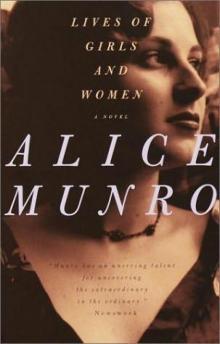 Lives of Girls and Women
Lives of Girls and Women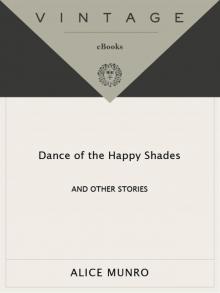 Dance of the Happy Shades
Dance of the Happy Shades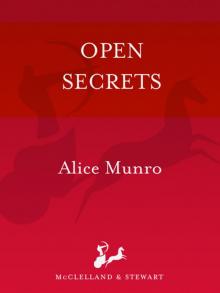 Open Secrets
Open Secrets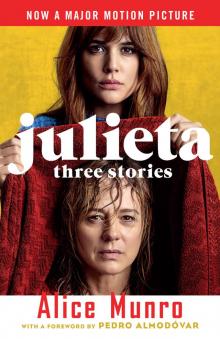 Julieta (Movie Tie-in Edition)
Julieta (Movie Tie-in Edition)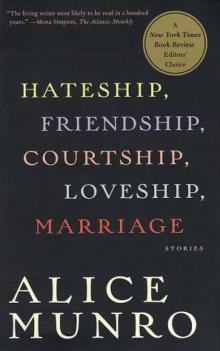 Hateship, Friendship, Courtship, Loveship, Marriage: Stories
Hateship, Friendship, Courtship, Loveship, Marriage: Stories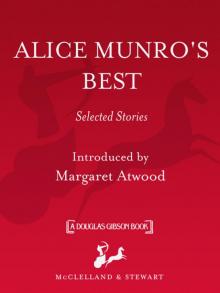 Alice Munro's Best
Alice Munro's Best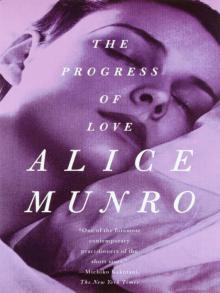 The Progress of Love
The Progress of Love Selected Stories
Selected Stories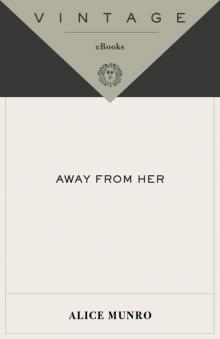 Away from Her
Away from Her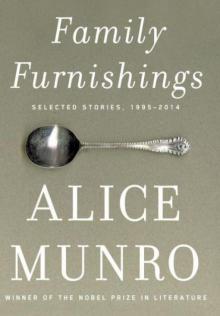 Family Furnishings
Family Furnishings Moons of Jupiter
Moons of Jupiter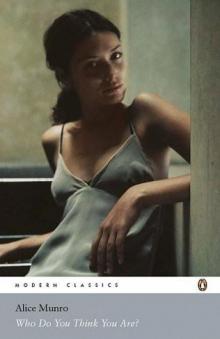 Who Do You Think You Are?
Who Do You Think You Are?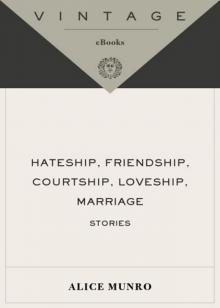 Hateship, Friendship, Courtship, Loveship, Marriage
Hateship, Friendship, Courtship, Loveship, Marriage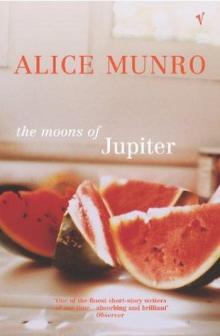 The Moons of Jupiter
The Moons of Jupiter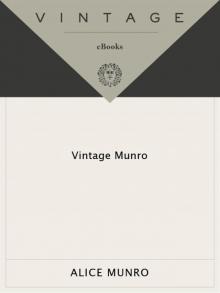 Vintage Munro
Vintage Munro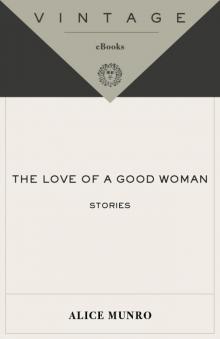 The Love of a Good Woman
The Love of a Good Woman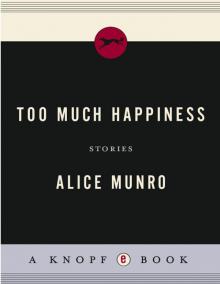 Too Much Happiness
Too Much Happiness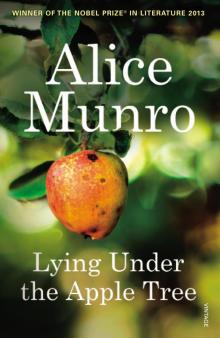 Lying Under the Apple Tree
Lying Under the Apple Tree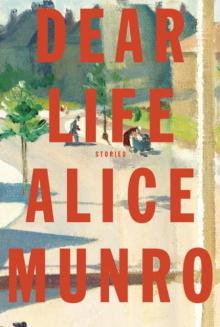 Dear Life
Dear Life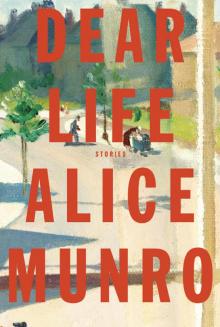 Dear Life: Stories
Dear Life: Stories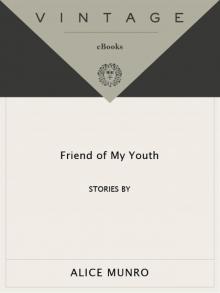 Friend of My Youth
Friend of My Youth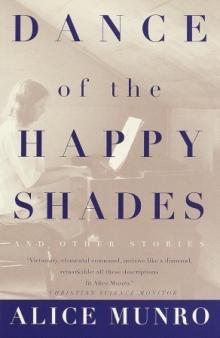 Dance of the Happy Shades: And Other Stories
Dance of the Happy Shades: And Other Stories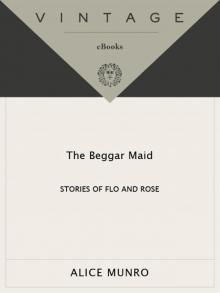 The Beggar Maid
The Beggar Maid